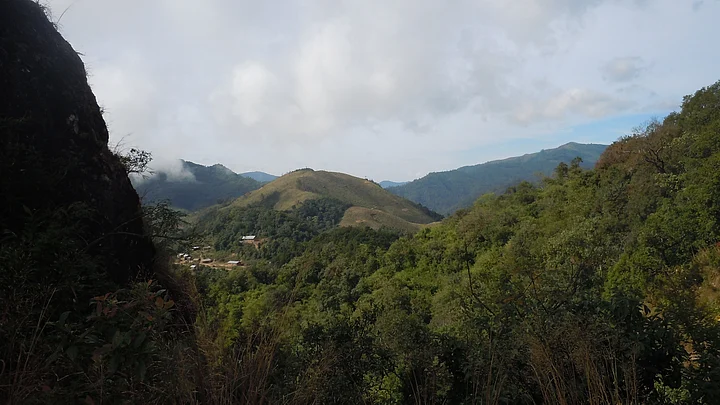When violence returns to this frontier territory of Manipur, people have only one option: scram.
It happened when the ethnic Naga-Kuki clash spread from these parts in the early 1990s. And now, again, as the Indian Army intensifies cross-border counter-insurgency operations after the June 4 attack near the India-Myanmar border, the village of Paraolon which is home to 500 Lamkang Nagas has emptied out. So have many of the 60 families living in nearby Kotal Khunthak.
Sensing trouble, villagers have moved to “safer” areas in Chandel district, camping at homes of relatives and friends. About 20 soldiers died when explosives planted by suspected militants allied to the National Socialist Council of Nagaland (Khaplang) ripped through a moving military convoy. The injured were airlifted to receive emergency medical aid.
Desperate Pleas
“Nobody is out there now. We are now trying to ask the government to provide security so that we can return to our village,” James Dilbung, 40, a Lamkang Naga leader and Paraolon’s village chief, told The Quint.
The urgency to return, said Dilbung, is because they left in a hurry, leaving behind farm animals – pigs and chicken – without sufficient food. It’s also because the incident occurred during the paddy-planting season; they were building fences in their jhumming land, now exposed to mithuns and other wild animals.
Most cultivable fields are located far away from these sparsely-populated villages along Samtal Road, inside thickly forested hills. Even sturdy, nimble-footed Kukis and Nagas who live in threadbare homes on the road’s margins take more than an hour-and-a-half to walk to work every day.
Stricken by Poverty
Altitude life along India’s eastern frontier – a land of rolling green hills and abundant water streams – is hardly romantic. Poverty is common. Government grants arrive in dribs and drabs. Apart from farming, the poor make a living by producing charcoal from felled trees, an arduous all-night shift that involves burning logs in earthen pits.
Living close to a poorly guarded international boundary – the smuggling route of contraband drugs and weapons – has other perils. People living here are the first to be questioned when something goes wrong.
“We can hardly live in peace,” said Dilbung.
In the late 1950s, the fragile tranquillity of hill life was shattered when the Indian Army arrived in search of men belonging to the secessionist Naga National Council (NNC), parent of the now faction-riven NSCN. Armed with the Armed Forces Special Powers Act (AFSPA), Naga villages were subjected to unimaginable torture.
Brutal Methods
The Act empowers security forces with shoot-to-kill orders, and this was used with impunity as they subjected entire villages to brutal treatment to single out militants. People were made to stand, hands-up, for hours in open areas, some were flogged and others hung upside down for days. A man from Larong, a village near Paraolon, was given electric shocks in his private parts, leaving him bruised and incapacitated for years.
The results have been disastrous. Entire villages converted to Christianity in this region, following the shrewd political sloganeering of NNC leader, Angami Zapu Phizo, who coined the phrase ‘Nagaland for Christ’. The last person to convert in Paraolon was in 1960.
These borderlands, where hardship is a way of life, is a good backdrop in which to contemplate the limits of India’s development programme. Apart from Samtal Road, there are no proper roads in Chandel district. There are no helicopter services for the people here to be airlifted when ill or injured.
Little has Changed
Before Samtal Road was laid, it was normal for villagers to volunteers to carry the ill and the aged on their backs to the nearest hospital in Chandel town, 18 km away. Little has changed. During monsoon the connecting road from Chandel town to Vomku village on Samtal Road, closes down. Even in dry winter, it looks like this:
It was completed in the early 1990s to ease military movement. It could be India’s loneliest road; a border trading outpost operates in Samtal, the last village on this stretch.
Three years ago, a gale blew off the roof of the only school in Paraolon, destroying the building. No assistance has arrived yet.
Some classes are now held at the village primary health centre. Teachers don’t want to live near this border. When requests to build a public water line went unheeded, villagers raised funds to bring water from a nearby waterfall on their own. Electricity is as fickle as the weather here, going off for weeks at a stretch.
As evening shrouds the surrounding hills in pitch darkness, one sees lights blinking at only one place: the army camp located at Moltuk, 7 km away. Dilbung now says he wants to bring solar lights to his village.
‘This is one of the wishes I have,” he says.
(Maitreyee Handique writes on India’s northeast and keeps a watch on labour, industrial safety and human rights issues)
